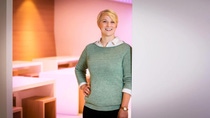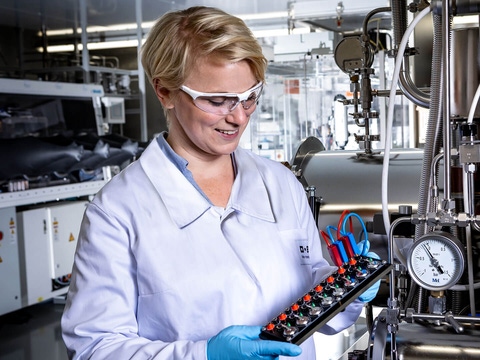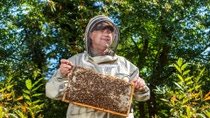Change for climate
Kathrin's story
If I discover something new, I have to share it... to tell everyone about it!
Kathrin Michel has been in love with chemistry for as long as she can remember. From the first sparks in the classroom to her time as a university researcher and now as an R&D lab team leader in BASF’s battery materials business, a love of science and learning has carried her throughout her career.
There’s no voyage like a voyage of discovery and, for Kathrin, the everyday thrill of unlocking new secrets from science has made her journey feel like a rollercoaster ride. “Every time I research a new effect or material property in chemistry, it is helping to progress the future of mobility. I find this really fascinating!” In Kathrin’s field, starting small can have a big impact: “When I look at electrons and atoms on a ‘nano’ scale, it allows me to understand how the battery will ultimately work.” It’s serious science but, in her enthusiasm, Kathrin reminds us of the human element at the heart of it all. She says: “If I discover something new, I have to share it... I have to tell everyone about it!”
Of course, we want electricity from green energy sources to power our cars. But it’s not just about driving electric vehicles, it’s also about how we manufacture the components to build the batteries.”
.jpg)
When it comes to the future, Kathrin is optimistic because she knows there’s still so much to discover.
While there’s undoubtedly some personal satisfaction to be found in sating her curiosity, it's Kathrin’s knowledge that her work is contributing to something bigger that drives her. Which leads her to the burning question of today: how do we reduce our reliance on fossil fuels? “Of course, we want electricity from green energy sources to power our cars. But it’s not just about driving electric vehicles, it’s also about how we manufacture the components to build the batteries ,” Kathrin points out.
To drive sustainability in electric vehicles, the topic of recycling is a big one. That’s because metals like lithium, cobalt, nickel, manganese and aluminium are essential in today’s EV batteries, yet some are quite rare or very expensive to mine, or both. But Kathrin and her colleagues are on the case. “We spend a lot of time thinking about the topic of recycling. How can we reuse car batteries that are now heading towards the waste cycle? How can we bring them back into the supply chain for future batteries?” In thinking about the bigger picture, improving the supply chain itself is a top priority for Kathrin, and for BASF as a company. “If we have a more regional supply chain, we cut CO₂ significantly by cutting transport from production. We’re creating a product that’s more sustainable before it even switches on.”
.jpg)
Science isn’t just rational, it’s creative. Kathrin ponders new directions for battery material development.
Kathrin’s work with battery materials is increasing EV sustainability as we know it. But she’s keen to point out that we’re only just beginning, and she wants to ensure the journey is continued by scientists to come.
It’s great to be able to share the fascination of science with the scientists of tomorrow. I want to continue to spread that enthusiasm. There’s so much more to discover, and they will pick up that mantle soon.”
.jpg)
.jpg)
.jpg)
.jpg)